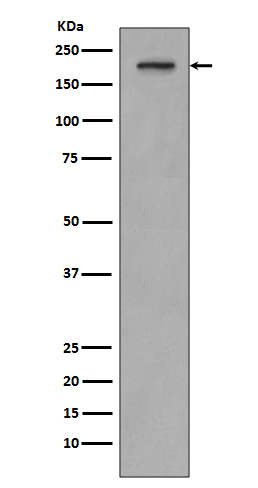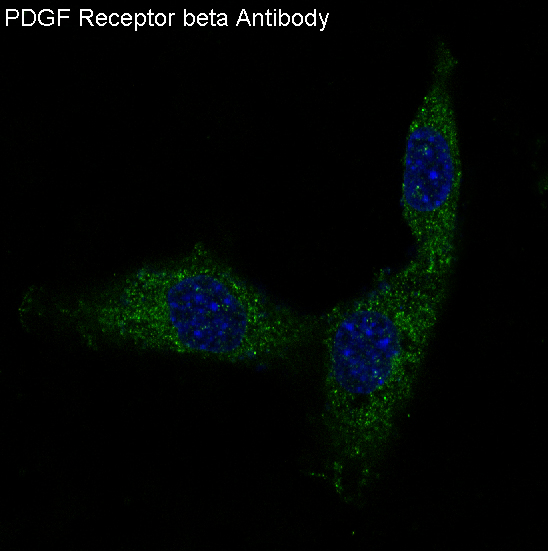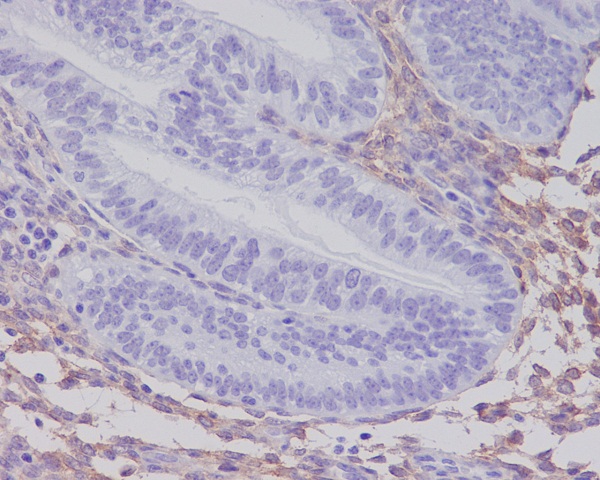


| WB | 1/500-1/1000 | Human,Mouse,Rat |
| IF | 1/20 | Human,Mouse,Rat |
| IHC | 1/50-1/100 | Human,Mouse,Rat |
| ICC | 1/50-1/200 | Human,Mouse,Rat |
| FCM | 咨询技术 | Human,Mouse,Rat |
| Elisa | 咨询技术 | Human,Mouse,Rat |
| Aliases | PDGFRB; PDGFR; PDGFR1; Platelet-derived growth factor receptor beta; PDGF-R-beta; PDGFR-beta; Beta platelet-derived growth factor receptor; Beta-type platelet-derived growth factor receptor; CD140 antigen-like family member B; Platelet-deri |
| Entrez GeneID | 5159 |
| WB Predicted band size | Calculated MW: 124 kDa; Observed MW: 170 kDa |
| Host/Isotype | Rabbit IgG |
| Antibody Type | Primary antibody |
| Storage | Store at 4°C short term. Aliquot and store at -20°C long term. Avoid freeze/thaw cycles. |
| Species Reactivity | Human,Mouse,Rat |
| Immunogen | A synthesized peptide derived from human PDGF Receptor beta |
| Formulation | Purified antibody in PBS with 0.05% sodium azide. |
+ +
1. **"PDGFRβ antibody inhibits mesenchymal stromal cell proliferation and enhances directional migration"**
- **Authors**: Smith A, et al.
- **摘要**: 研究验证了一种特异性抗PDGFRβ抗体对间充质基质细胞(MSCs)的作用,发现其能抑制细胞增殖并增强特定趋化因子诱导的定向迁移,提示其在组织修复和纤维化治疗中的潜在应用。
2. **"Targeting PDGFRβ in cancer-associated fibroblasts with a monoclonal antibody inhibits tumor progression"**
- **Authors**: Johnson R, et al.
- **摘要**: 通过单克隆抗体阻断肿瘤微环境中癌症相关成纤维细胞(CAFs)的PDGFRβ信号,显著抑制小鼠模型中肿瘤生长和转移,强调了PDGFRβ在肿瘤基质交互中的关键作用。
3. **"A novel PDGFRβ antibody-drug conjugate demonstrates efficacy in glioblastoma models"**
- **Authors**: Lee S, et al.
- **摘要**: 报道一种新型PDGFRβ抗体-药物偶联物(ADC),在胶质母细胞瘤模型中显示靶向递送化疗药物的能力,显著延长生存期,为PDGFRβ高表达肿瘤的治疗提供新策略。
4. **"PDGFRβ antibody blockade attenuates pulmonary fibrosis via inhibition of fibroblast activation"**
- **Authors**: Chen H, et al.
- **摘要**: 研究显示,抗PDGFRβ抗体通过抑制成纤维细胞活化和胶原沉积,有效减轻小鼠肺纤维化模型的病理进展,支持PDGFRβ作为纤维化疾病的治疗靶点。
以上文献涵盖PDGFRβ抗体在肿瘤微环境、纤维化疾病、药物开发及细胞行为调控中的应用,均聚焦于其靶向治疗的机制和效果验证。
The platelet-derived growth factor receptor beta (PDGFRβ) is a transmembrane tyrosine kinase receptor crucial for regulating cell proliferation, migration, survival, and angiogenesis. It binds to PDGF ligands (e.g., PDGF-BB), triggering receptor dimerization, autophosphorylation, and downstream signaling via pathways like PI3K/AKT, MAPK, and STAT. PDGFRβ is essential in embryonic development, wound healing, and tissue homeostasis but is also implicated in pathological conditions, including cancer, fibrosis, and cardiovascular diseases. Aberrant PDGFRβ signaling promotes tumor growth, metastasis, and stromal activation, making it a therapeutic target.
PDGFRβ antibodies are tools or therapeutics designed to detect or modulate receptor activity. As research reagents, they enable the detection of PDGFRβ expression, phosphorylation status, and localization in cells/tissues via techniques like Western blotting, immunohistochemistry, or flow cytometry. Therapeutically, neutralizing antibodies (e.g., olaratumab) block ligand-receptor interactions or receptor activation, suppressing oncogenic signaling. These antibodies are explored in cancers (e.g., glioblastoma, sarcoma) and fibrotic disorders. Conversely, agonist antibodies may enhance regenerative signaling in certain contexts.
Current research focuses on optimizing PDGFRβ-targeted therapies, often in combination with chemotherapy or immunotherapy, to overcome resistance and improve efficacy. Challenges include understanding tissue-specific signaling and minimizing off-target effects. PDGFRβ remains a key focus in translational oncology and regenerative medicine.
×